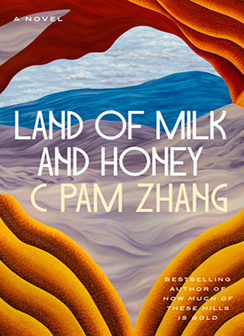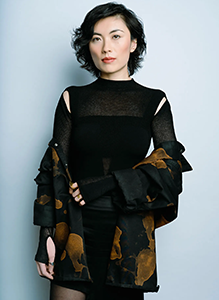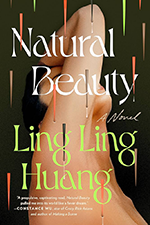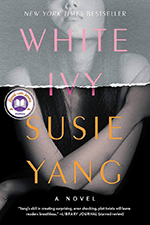
Land of Milk and Honey
by C Pam Zhang
GENRE: Contemporary Fiction, Literary Fiction, Dystopian
A smog has spread. Food crops are disappearing. A chef escapes her career in London to take a job at a decadent mountaintop colony seemingly free of the world's troubles. There, her enigmatic employer and his visionary daughter have built a lush new life for the global elite, one that reawakens the chef to the pleasures of taste, touch and her own body.
In this atmosphere of hidden wonders and seductive violence, the chef's boundaries undergo a thrilling erosion. Soon she is pushed to the center of a startling attempt to reshape the world far beyond the plate.
 Author Biography
Author Biography
C Pam Zhang is the author of two bestselling novels, How Much of These Hills Is Gold and Land of Milk and Honey. She a National Book Foundation 5 Under 35 Honoree, a Booker Prize nominee, and the winner of the Academy of Arts and Letters Rosenthal Award, the Asian/Pacific Award for Literature, and the California Book Award. She has been a finalist for awards from PEN America, the National Book Critics Circle, and the Center for Fiction. Zhang’s writing appears in Best American Short Stories, The Cut, The New Yorker, and The New York Times. - Author's website
Kirkus
Climate disaster provides both setting and a sense of urgency to Zhang’s second novel.
“I fled to that country because I would have gone anywhere, done anything, for one last taste of green sharp enough to pierce the caul of my life.” A cloud of smog has enveloped the Earth, hiding the sun and killing most of the planet’s food crops. A young chef takes a job at an “elite research community” perched atop an Italian mountain. Her employer is enigmatic and unnerving. His daughter is brilliant and headstrong. And the chef soon discovers that she is imprisoned in a simulacrum of paradise bound by secrets and ghosts. But, as she cooks lavish meals for those who can afford to escape the smog, she has access to crème fraîche, strawberries, and a French breed of chicken that should be extinct. To say that the narrator represents the moral center of this universe is not to say that she is incorruptible. This is, among other things, a story of what survival looks like in a world riven by gross inequality, and the narrator’s choices are driven by self-interest. Often, those choices come with a side order of self-loathing—a familiar dynamic for many participating in late capitalism. None of this, however, should suggest that Zhang has written a manifesto. Instead, she reminds us of what it’s like to be embodied and living on Earth with sumptuous scenes of food and sex. Zhang earned bountiful accolades—including being longlisted for the Booker Prize—for How Much of These Hills Is Gold (2020), and her skills have only increased since she wrote her stunning debut.
Mournful and luscious, a gothic novel for the twilight of the Anthropocene Era.
Copyright (c) Kirkus Reviews, used with permission.
Publisher's Weekly
Zhang’s exquisite and seductive second novel (after How Much of These Hills Is Gold) centers on an unnamed chef, 29, who is trying to survive in the wake of an environmental catastrophe that wreaked havoc on the earth’s biodiversity. Raised in Los Angeles by a single immigrant mother, the chef chased complex flavors and busy kitchens since she was 19. But when the disaster decimated kitchen ingredients and shuttered borders, she was left cooking with years-old fish and bioengineered flour: “Chef had lost its meaning... like fresh.” In a desperate attempt to change her surroundings, she takes a head chef position at a secretive food research community on the mountainous Italian-French border, which holds a surprising storeroom with the world’s last strawberries, Parmigiano, and boar meat. Her transition to cooking for investors she cannot meet is difficult—she has no access to the outside world and she can’t stomach the rich food. But she becomes preoccupied with Aida, the boss’s mischievous 20-year-old daughter, who shows up to test her cooking. Aida and her father see their facility as the planet’s last hope, and the chef soon learns that her role extends beyond food to enabling a world that caters to their ambition. Wrestling with her desire for both excitement and stability, the chef must squash the inner voice that asks, “Hadn’t I meant to feed anyone else?” Emotionally captivating and raw, this masterpiece will be enjoyed to the last bite. Agent: Bill Clegg, Clegg Agency. (Sept.)
Booklist
This might be how the end begins. Near-global smog leads to the occlusion of the sun. Under these harrowing conditions, the 29-year-old narrator, a disappointment to her Chinese immigrant mother, lands a job as a cook in an exclusive institution atop an Italian mountain. A megarich entrepreneur, with the help of his daughter, Aida, is clinging to the last food bounties. As chef, the narrator has to spin one impressive dish after the other to satiate hungry investors. But she soon finds that her role, including her relationship with Aida, has morphed. And the locals are battering down the ramparts for a slice of the Edenic pie. Zhang (How Much of These Hills Is Gold, 2020) paints an image of the promised land of milk and honey that saturates the senses. Practically every sentence is gold; for instance, “The simmer of her rage was intoxicating, heady, the surface of a broth about to boil and release its pungent scent,” Zhang writes of Aida. The narrator struggles to reconcile her new world with the one she left behind even as she is consumed by her appetites for food, for love, for survival. Ending on a hopeful note, this sumptuous feast is an absolute marvel. Savor every delicious morsel. - Poornima Apte
 The Dream Builders
The Dream Builders
by Oindrila Mukherjee
After living in the US for years, Maneka Roy returns home to India to mourn the loss of her mother and finds herself in a new world. The booming city of Hrishipur where her father now lives is nothing like the part of the country where she grew up, and the more she sees of this new, sparkling city, the more she learns that nothing―and no one―here is as it appears. Ultimately, it will take an unexpected tragic event for Maneka and those around her to finally understand just how fragile life is in this city built on aspirations.
Written from the perspectives of ten different characters, Oindrila Mukherjee’s incisive debut novel explores class divisions, gender roles, and stories of survival within a society that is constantly changing and becoming increasingly Americanized. It’s a story about India today, and people impacted by globalization a tale of ambition, longing, and bitter loss that asks what it really costs to try and build a dream.
 Natural Beauty
Natural Beauty
by Ling Ling Huang
In this sly, surprising, and razor-sharp debut novel, a virtuoso pianist gives up her future as a musician to work at a high-end wellness store in New York City where the pursuit of beauty comes at a staggering cost. Our narrator is the youngest student at the Conservatory. She produces a sound from the piano no one else does, employing a special technique she learned from her parents-also stunningly talented musicians-who fled China in the wake of the Cultural Revolution. But when an accident leaves her parents debilitated, she abandons her future as a pianist and accepts a job at a high-end beauty and wellness store in New York City. Holistik is known for its remarkable products and outrageous procedures: remoras that suck cheap Botox from the body, eyelash extensions made of spider silk, emotional support ducklings bred to imprint on their owners. Every product is ethically sourced and made with nothing but the highest quality ingredients. Our narrator's new job is a coveted one among New York's beauty-obsessed, and it affords her entry into a new world of privilege. She becomes transfixed by Helen-a model, and the niece of Holistik's charismatic owner-and the two strike up a close friendship that hazily veers into more. All the while, Holistik plies our narrator with products that slim her thighs, smooth her skin, lighten her hair, and change her eye color. But beneath these fancy creams and tinctures lies a terrible truth that threatens to consume her. After all, beauty is nothing without ugliness.
 White Ivy
White Ivy
by Susie Yang
Ivy Lin is a thief and a liar—but you’d never know it by looking at her.
Raised outside of Boston, Ivy’s immigrant grandmother relies on Ivy’s mild appearance for cover as she teaches her granddaughter how to pilfer items from yard sales and second-hand shops. Thieving allows Ivy to accumulate the trappings of a suburban teen—and, most importantly, to attract the attention of Gideon Speyer, the golden boy of a wealthy political family. But when Ivy’s mother discovers her trespasses, punishment is swift and Ivy is sent to China, and her dream instantly evaporates.
Years later, Ivy has grown into a poised yet restless young woman, haunted by her conflicting feelings about her upbringing and her family. Back in Boston, when Ivy bumps into Sylvia Speyer, Gideon’s sister, a reconnection with Gideon seems not only inevitable—it feels like fate.
Slowly, Ivy sinks her claws into Gideon and the entire Speyer clan by attending fancy dinners, and weekend getaways to the cape. But just as Ivy is about to have everything she’s ever wanted, a ghost from her past resurfaces, threatening the nearly perfect life she’s worked so hard to build.